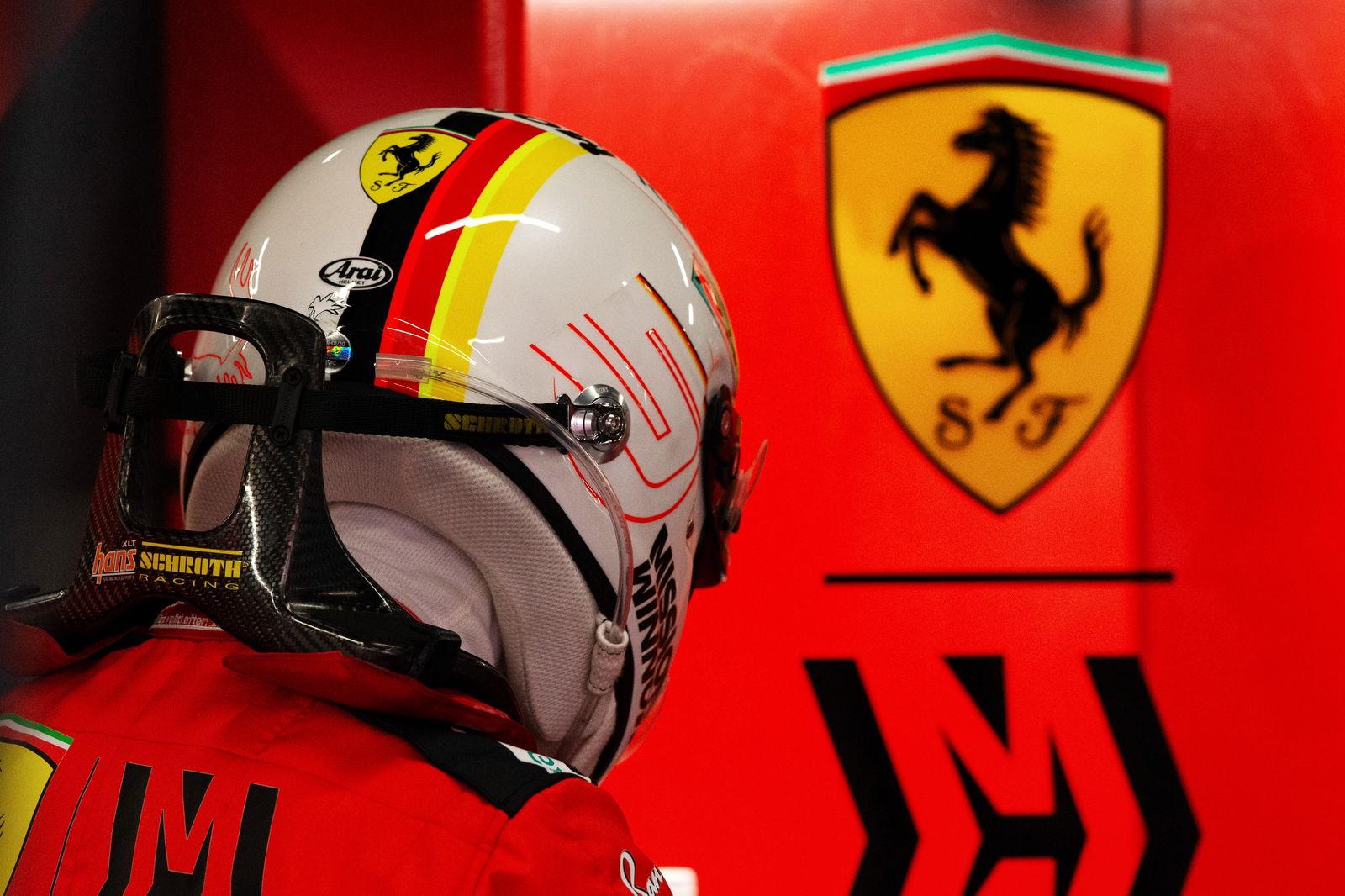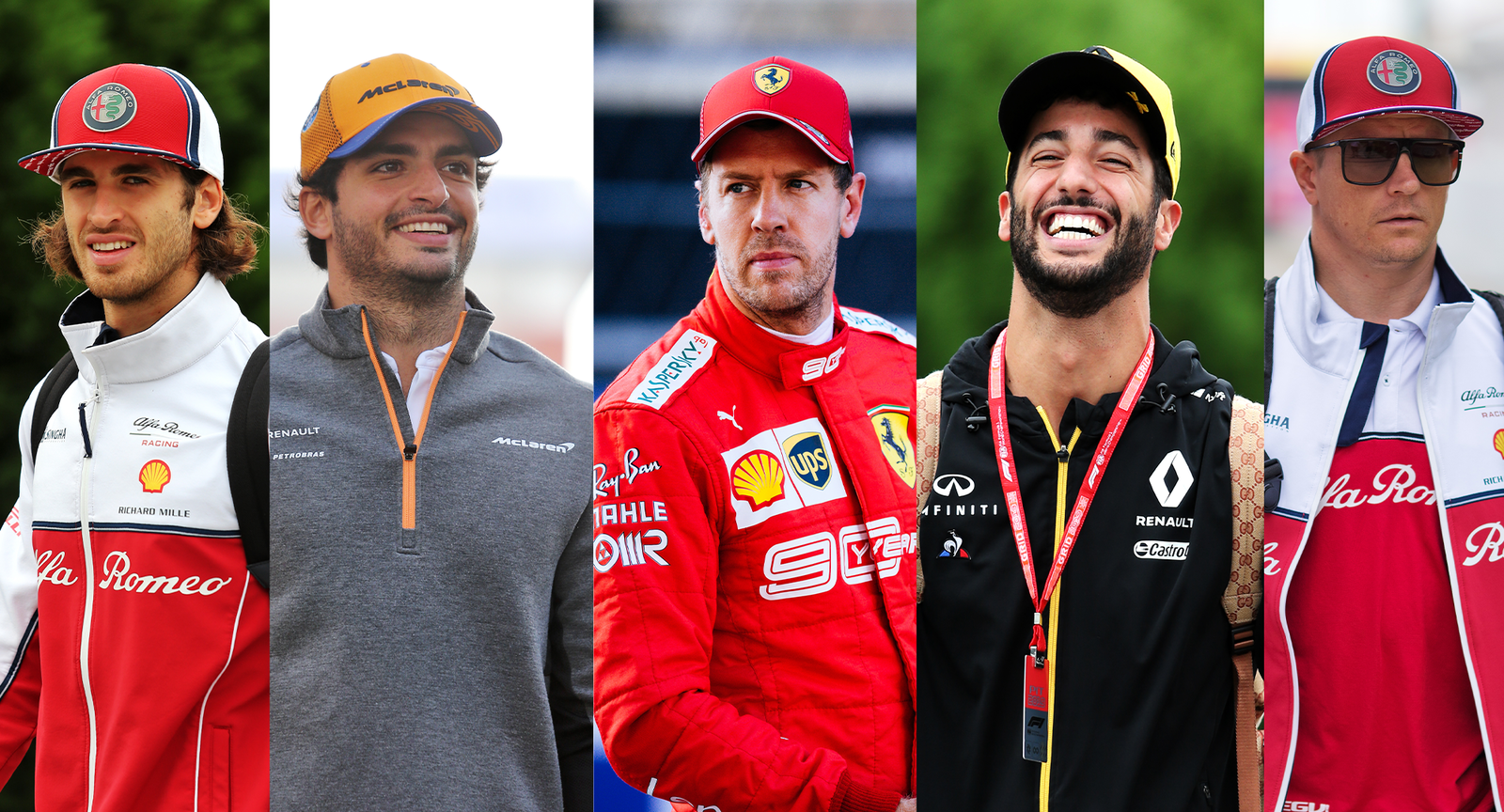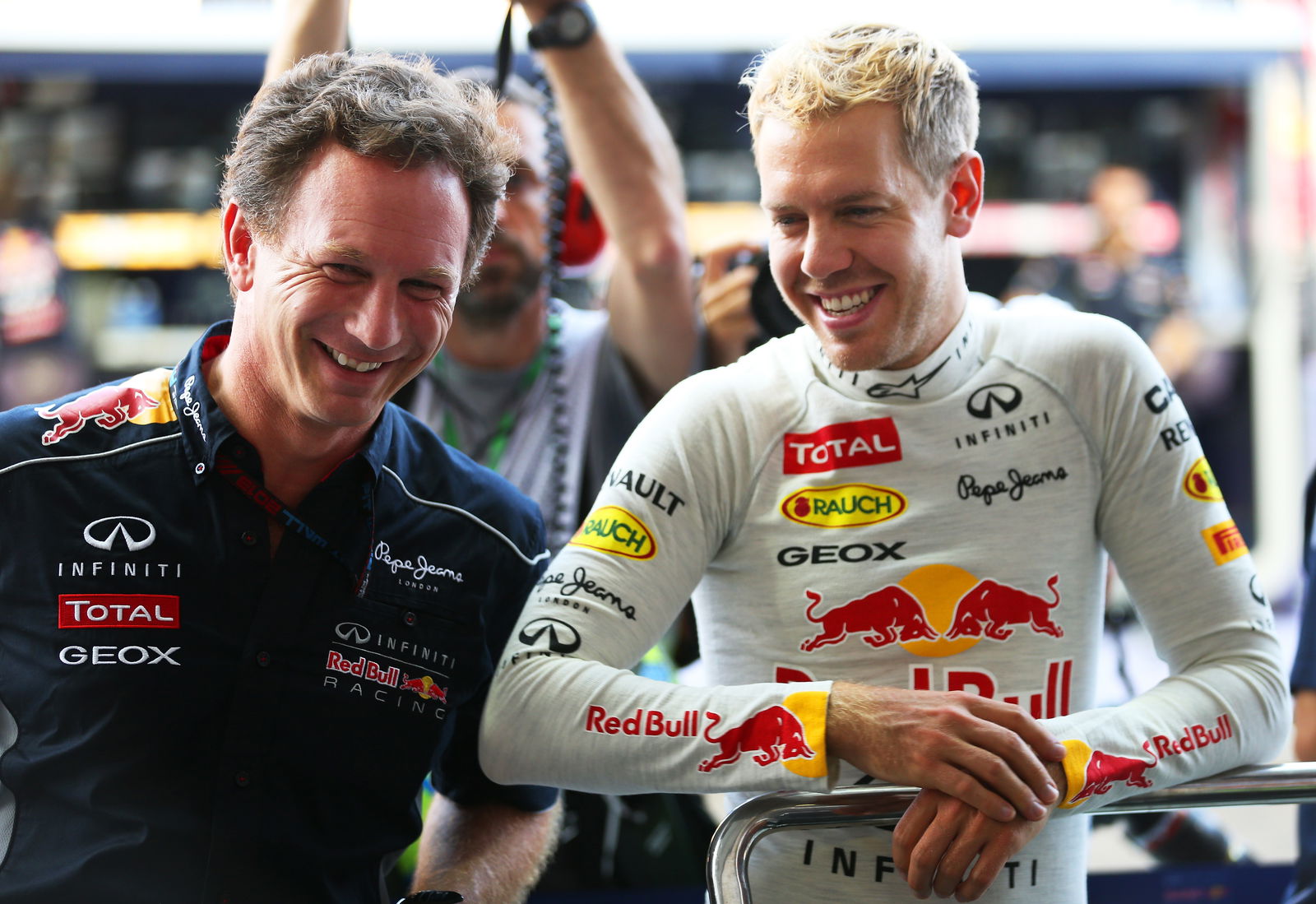How Vettel’s Ferrari dreams collapsed under the weight of expectation
Sebastian Vettel joined Ferrari in 2015 with the sole objective of following in the footsteps of his childhood hero Michael Schumacher and win the Formula 1 world championship with the Scuderia.
However, after five seasons and over 100 starts in the famous scarlet red overalls, there have been 14 victories but as yet no world championship titles.
Tuesday’s announcement confirming Vettel and Ferrari will part ways at the end of the 2020 F1 season brings an end to a journey that promised so much but a few high moments aside, will be viewed as a failure overall.

Sebastian Vettel joined Ferrari in 2015 with the sole objective of following in the footsteps of his childhood hero Michael Schumacher and win the Formula 1 world championship with the Scuderia.
However, after five seasons and over 100 starts in the famous scarlet red overalls, there have been 14 victories but as yet no world championship titles.
Tuesday’s announcement confirming Vettel and Ferrari will part ways at the end of the 2020 F1 season brings an end to a journey that promised so much but a few high moments aside, will be viewed as a failure overall.
The moment Vettel confirmed he was Ferrari-bound, there was no getting away from the obvious comparisons between himself and Schumacher.
Here was Vettel calling time on his successful (albeit at the time floundering) tenure at Red Bull that yielded four consecutive titles between 2010 and 2013, much like Schumacher after he traded in his title-winning Benetton stint for a shot at glory with Ferrari. On each occasion, both drivers joined a Ferrari team mired in a lacklustre run of form.
Vettel’s status as the most successful driver in F1 was only halted with the introduction of the V6 hybrid engines in 2014 and Daniel Ricciardo’s arrival at Red Bull, a combination which ultimately paved the way for a move to Ferrari.
Arriving at the Scuderia as replacement for Fernando Alonso, who despite some close calls was unable to add to his previous two world titles, Vettel was tasked with rebuilding Ferrari and turning around its fortunes following its first winless campaign since 1993.
Vettel quickly asserted himself as Ferrari’s number one driver and comfortably had the measure of teammate Kimi Raikkonen from the outset. It took Vettel just two races to record his first Ferrari win, courtesy of a peerless performance at the 2015 Malaysian Grand Prix, and he became an instant hit at Maranello.
Two impressive victories followed in Hungary and Singapore during a season otherwise dominated by the Silver Arrows of Lewis Hamilton and Nico Rosberg, with Vettel the only non-Mercedes driver to win a race that year as he established himself as the nearest challenger. Vettel amassed almost double the points Raikkonen managed in his maiden season.
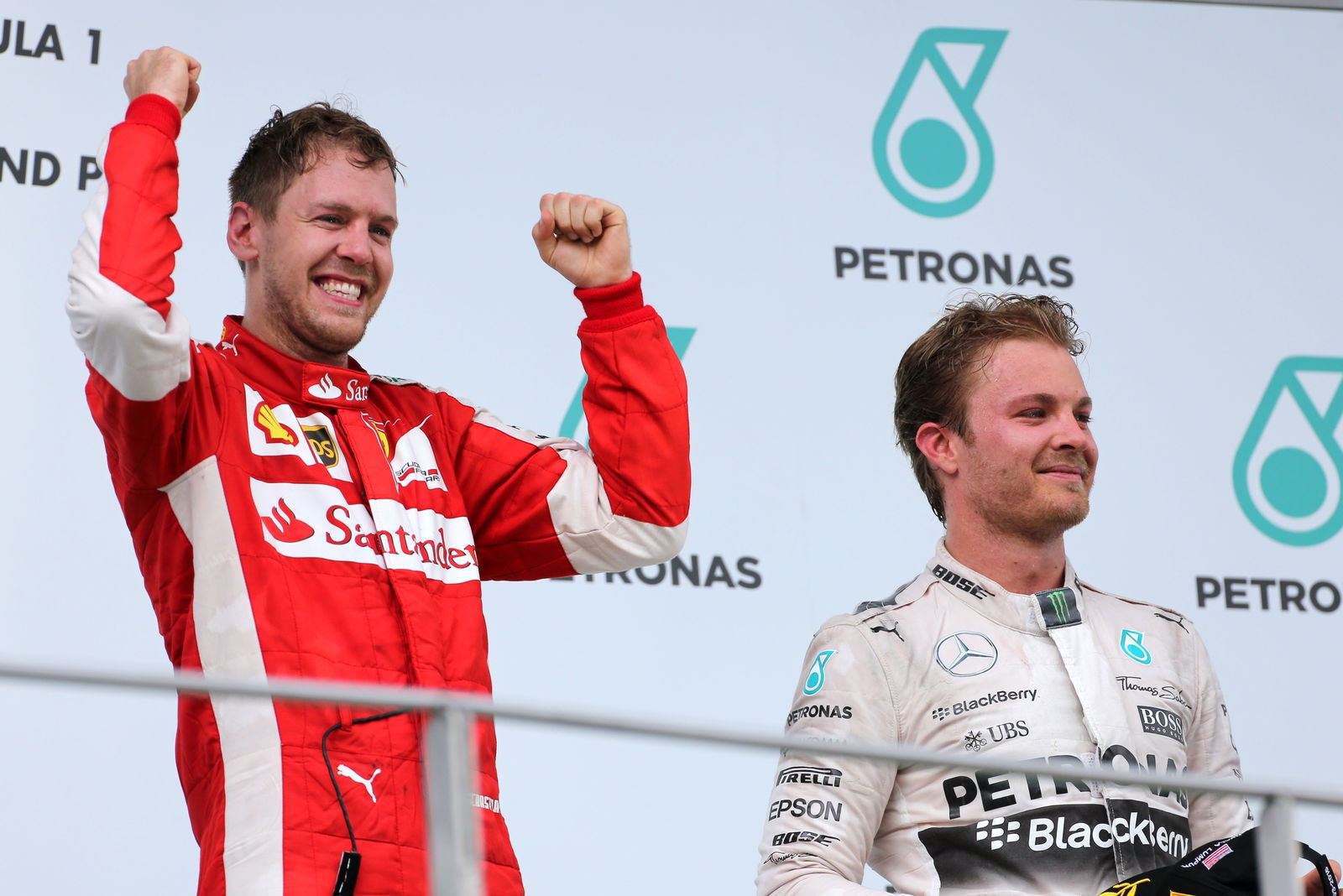
Moreover, as Hamilton and Rosberg bogged themselves down in internal squabbles, Vettel seemed to be relishing his new status as the plucky underdog.
Much more was expected in 2016 but the season proved to be a huge disappointment as Ferrari took a backwards step in the fight against Mercedes, with Red Bull instead proving the closest threat to the German manufacturer’s supremacy. Vettel was still able to lead the team to seven podiums but that was as good as it would get and he ended the year fourth in the championship.
With expectations rising, the strain of the pressure began to tell on numerous occasions, beginning innocuously enough with the ‘Radio Vettel’ blue flag complaints over the TV feeds. However, it was his extraordinary expletive-laden outburst at the late Charlie Whiting in Mexico when he was caught up in a final lap fracas with Max Verstappen that turned it from a joke into a matter for the FIA.
Vettel said his reaction was in the heat of the moment, but it wouldn’t be the last alarming error he’d commit when stress levels rose.
A major aerodynamic rules overhaul for 2017 gave Ferrari a much-needed boost and helped it narrow the gap to Mercedes and leapfrog back ahead of Red Bull in the pecking order.
Ferrari got out of the blocks quickly with Vettel victorious in the season-opener in Melbourne. Vettel won three of the first six rounds of the season and established an early lead in the championship, which he built on to hold a 14-point lead over Hamilton heading into the summer break.
That was despite another controversial red-mist moment when he rammed into Hamilton in Baku while they toured the city's streets under Safety Car conditions. Hamilton claimed Vettel had “disgraced” himself with the incident, which somewhat tarnished the otherwise excellent start to the season he had made.
But Vettel’s title bid derailed after the summer break. Hamilton’s run of supreme form coincided with a series of devastating reliability failures for Vettel, and a costly first-lap crash with Raikkonen and Max Verstappen in Singapore, across the Asian leg of the campaign. Vettel recorded just one win in the final nine races as he slumped to runner-up spot behind Hamilton, who went on to match Vettel’s tally of four world championships.
Ferrari made further gains in 2018 but despite making another promising start to the season with Vettel sealing back-to-back wins, things once again began to fall apart.
Ferrari held the edge over Mercedes for much of the opening rounds with a faster overall package but after the high of beating Hamilton on home soil at Silverstone, what followed was a crushing blow that just might end up being the defining image of Vettel’s Ferrari tenure.
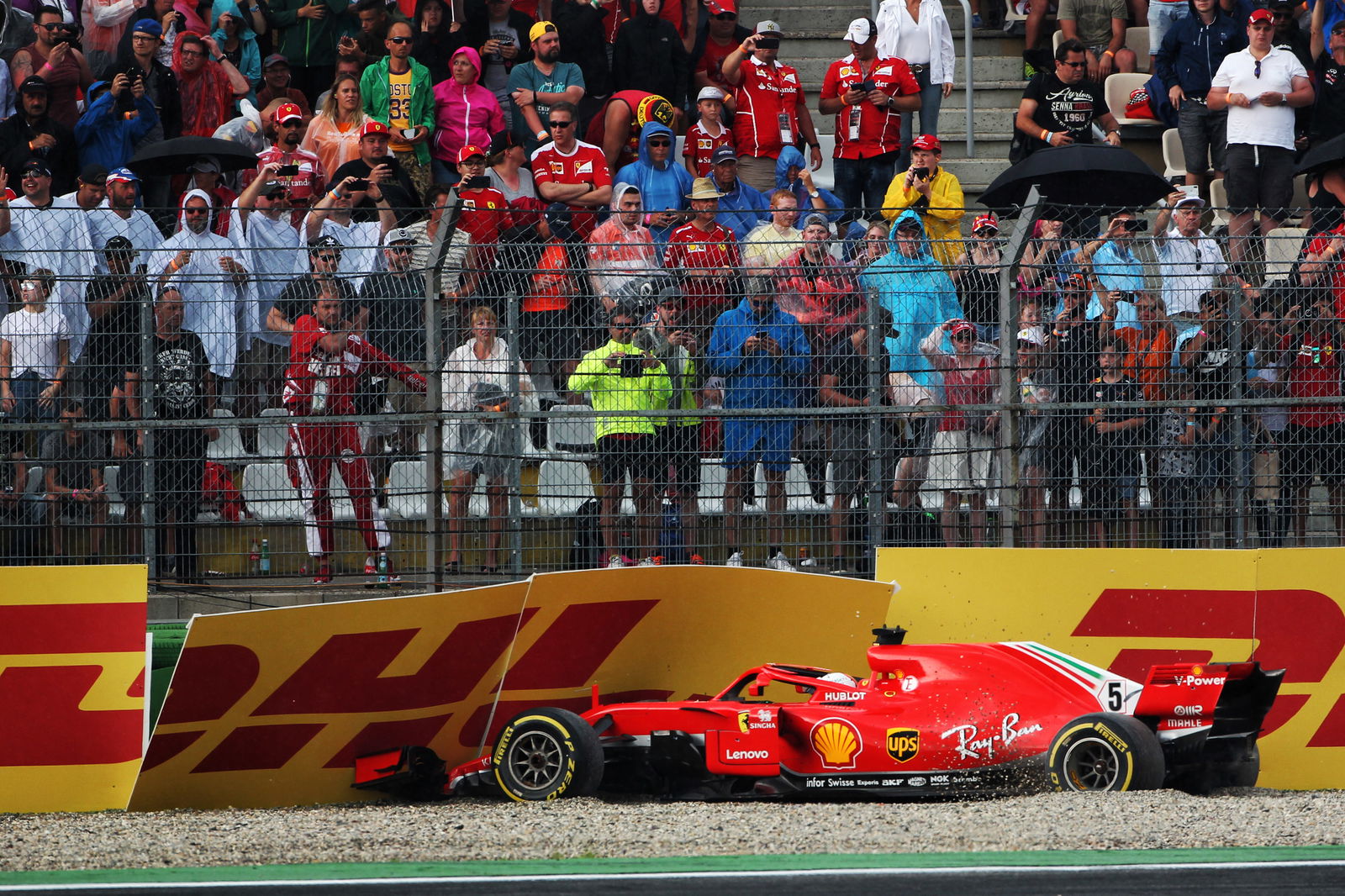
Vettel looked set to land his first home victory at Hockenheim having led much of the race from pole position, but a late rain shower saw him slide off the wet track and crash out of the lead with only a handful of laps remaining. His catastrophic error opened the door for Hamilton to remarkably win from 14th on the grid and enjoy a 38-point swing in his favour.
Germany turned the tide in the 2018 title fight and Hamilton never looked back, going on to win his fifth world title to move clear of Vettel in the history books. Vettel managed just one more win in Belgium but cracked under the pressure by spinning in wheel-to-wheel combat with Hamilton on the opening lap of Ferrari’s home race at Monza. More notable spins followed in Suzuka and Austin and Vettel ended the year with his reputation severely wounded.
A recovery was tipped in 2019 as Ferrari once again looked strong in pre-season testing, but its winter performance failed to translate to the track when it mattered most and Mercedes and Hamilton romped into a clear championship advantage in the first half of the year.
The season proved to be the beginning of the end for Vettel as he struggled to come to terms with the emerging talent of new teammate Charles Leclerc, who was threatening his once comfortable dynamic within the team by refusing to play second fiddle. Ferrari must take some blame for its poor handling of the situation, which came to a head with a collision in Brazil, but it was a sure sign the Scuderia was shifting the focus of its attention to the other side of the garage.
Vettel’s critical mistakes quickly began to overshadow his successes. He once again spun while battling Hamilton during a nightmare race in Bahrain, while his spin during the Italian Grand Prix - and subsequent reckless rejoining of the circuit into the path of Lance Stroll - were sobering even before he was forced to watch Leclerc secure a famous first Ferrari win on home soil 2010.
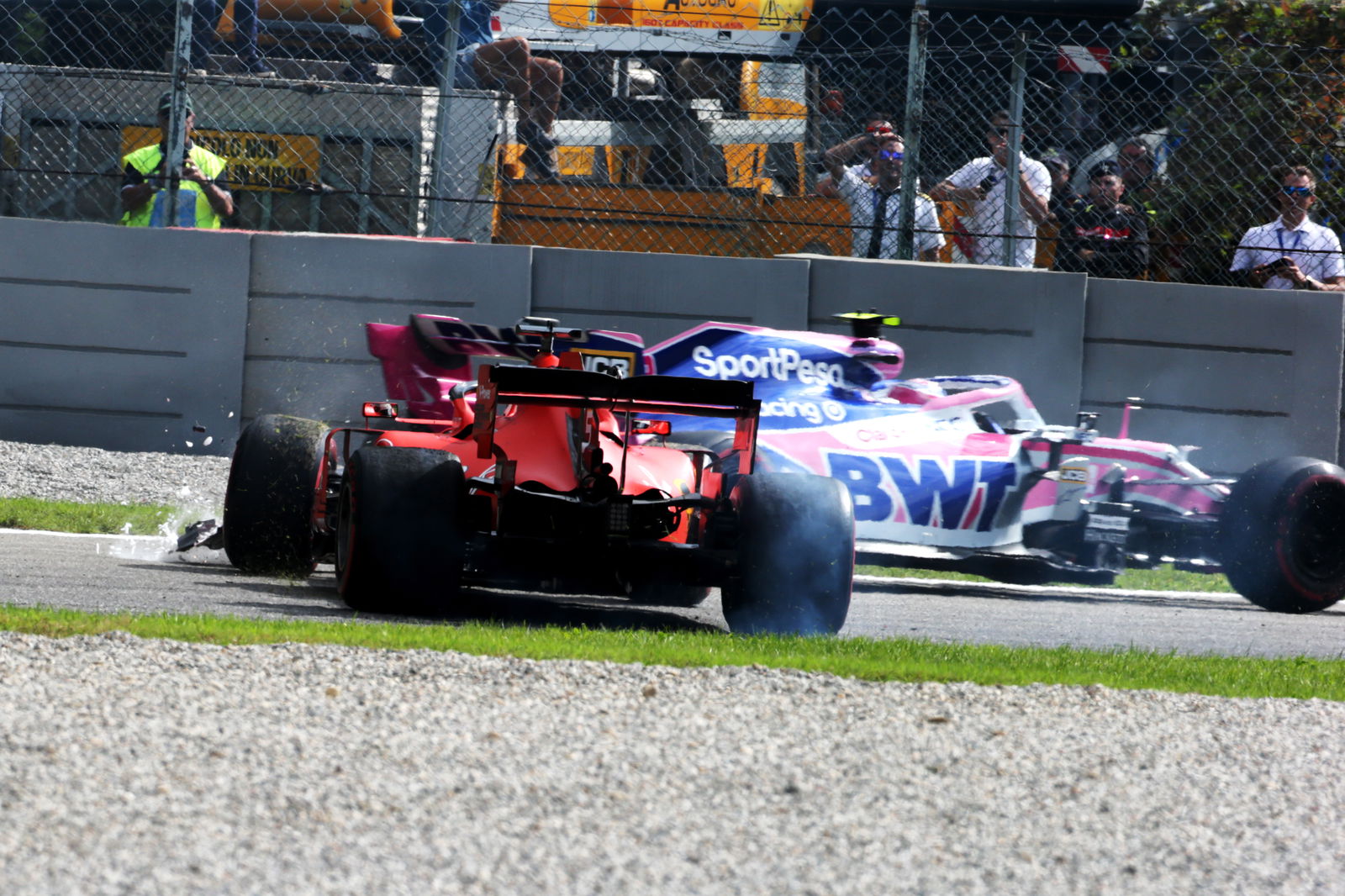
There were glimpses of Vettel’s brilliant best, highlighted by his dominant performance in Canada prior to his key mistake, his first victory in over a year in Singapore (which made him Ferrari’s third winningest driver in history), and a supreme pole position lap at Suzuka, but these moments were few and far between.
As Leclerc rose to the occasion and began to upstage Vettel amid disagreements over team orders and rising friction between the pair, the latter faded to his worst result of the V6 hybrid era in fifth. Across the season, Leclerc outperformed Vettel in every department - wins, poles, points and average qualifying pace. It marked the first time since 2014 that Vettel was beaten in the standings by a teammate.
A new long-term contract tying Leclerc down at Ferrari until 2024, announced in December last year, was an indication that the balance of power was shifting at Maranello and that Ferrari was beginning to put its faith behind its new chosen one.
Despite this, Vettel insisted as recently as last month that his intention was to stay with Ferrari beyond his current contract because he remained as determined as ever to deliver the team’s first title since 2008. But talks ultimately broke down with Vettel unwilling to accept Ferrari’s fresh terms to stay alongside Leclerc.
Somewhere along the way during an unexpected period of reflection due to the coronavirus-related hiatus, Vettel had a change of heart after realising there was “no longer a common desire to stay together beyond the end of this season.”
It remains to be seen whether the 32-year-old will stay and drop down to F1’s midfield - possibly with McLaren, Renault, or even Aston Martin - or walkaway from the sport altogether.
But in his sixth and final year at Ferrari, Vettel faces a tough task if he is going to emulate Schumacher by winning a title given the team’s focus is most likely going to be on Leclerc - that is assuming the 2020 championship is able to start at all amid the ongoing COVID-19 pandemic.
Barring the most unlikely of happy endings, what was a dream will conclude as mission failed for Vettel.
